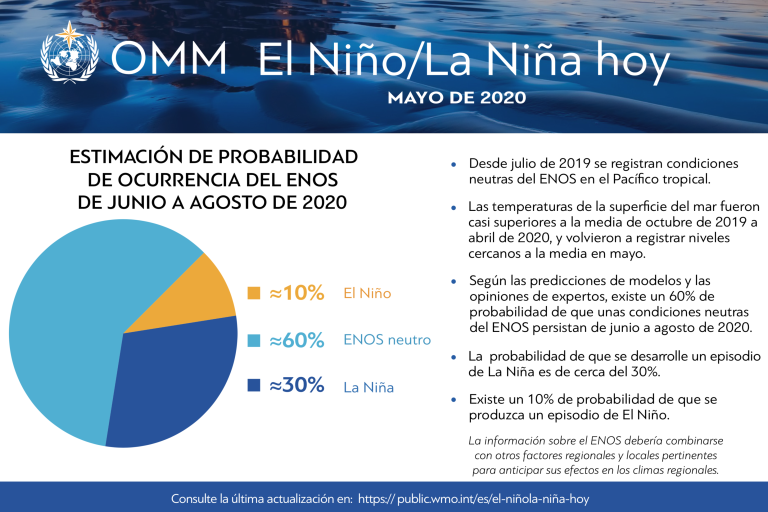El Niño / La Niña Update (May 2020)
Sea surface temperature conditions in the tropical Pacific remain neutral in terms of El Niño-Southern Oscillation (ENSO) status, signifying that neither El Niño nor La Niña is currently prevailing. Recent cooling of the sub-surface waters in the region has subsequently caused the hitherto slightly above-average sea surface temperatures to return to near-average levels during May. The latest seasonal forecasts from the WMO Global Producing Centers of Long Range Forecasts (GPCs-LRF) indicate that tropical Pacific sea surface temperatures are likely to cool further, potentially approaching weak La Niña levels during the second half of 2020. Given current conditions and model predictions, the chance of ENSO-neutral conditions continuing through June-August 2020 is estimated to be around 60%, with a 30% chance of La Niña. Chances for La Niña rise to 40% for the September-November period. National Meteorological and Hydrological Services will closely monitor changes in the state of ENSO over the coming months and provide updated outlooks, taking into account the relatively greater uncertainty in seasonal forecasts at this time of the year.

Sea surface temperature conditions in the tropical Pacific remain neutral in terms of El Niño-Southern Oscillation (ENSO) status, signifying that neither El Niño nor La Niña is currently prevailing. Recent cooling of the sub-surface waters in the region has subsequently caused the hitherto slightly above-average sea surface temperatures to return to near-average levels during May. The latest seasonal forecasts from the WMO Global Producing Centers of Long Range Forecasts (GPCs-LRF) indicate that tropical Pacific sea surface temperatures are likely to cool further, potentially approaching weak La Niña levels during the second half of 2020. Given current conditions and model predictions, the chance of ENSO-neutral conditions continuing through June-August 2020 is estimated to be around 60%, with a 30% chance of La Niña. Chances for La Niña rise to 40% for the September-November period. National Meteorological and Hydrological Services will closely monitor changes in the state of ENSO over the coming months and provide updated outlooks, taking into account the relatively greater uncertainty in seasonal forecasts at this time of the year.










